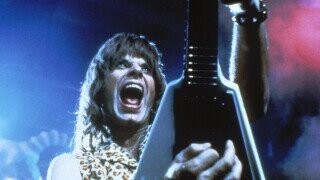'Spinal Tap's Children: 'Parks And Rec' And 'The Office'

Welcome to ComedyNerd, Cracked's daily comedy Superstation. For more ComedyNerd content, and ongoing coverage of the Iran/Contra Affair, which definitely has armadillos in its trousers, please sign up for the ComedyNerd newsletter below.
In 1984, a ‘documentary’ film juxtaposed the loud, abrasive energy of a famous rock and roll band on tour with the awkward, subdued malaise of coworkers who are starting to get a little too sick of each other. Spinal Tap, fashioned as a discount Led Zeppelin, (not coincidentally, the movie more than casually parodies Zep's overindulgent epic The Song Remains The Same) slowly unravels on the downward slope of their popularity, all captured by a diegetic documentary crew headed by Rob Reiner.
Don't Miss
This Is Spinal Tap was co-writer and co-star Christopher Guest’s first turn in a mockumentary, a form that he would hammer home to perfection throughout his career. The movie reinforced that comedy lives in its characters, and its mockumentary style brings out raw, awkward, uncomfortable nuggets of comedy gold from the stark dissonance between what characters say to the camera and how they act around each other.
The mockumentary would come to dominate 2000s television comedy, but before The Office, before Parks and Rec, there was This Is Spinal Tap. And they rocked.
Kindly turn your volume up to … oh, you know.
It All Started … In Radio And The Fab Four?
The mockumentary-- or pseudo-documentary-- has been around since the 1930’s, with one of the earliest and most famous examples being Orson Welles’ radio play The War of the Worlds, which was presented as a news broadcast ostensibly reporting on an alien invasion in real time.
The urban legend goes that far-too-many listeners believed the report to be true, and Welles inadvertently created a mass hysteria event that had gullible rubes preparing for an attack from Mars. The evidence to support the legend is spotty, but it was enough to make War of the Worlds a touchstone event in cultural history. After all, how many other radio plays can the average person name?
While there’s certainly humor in an unspecified number of people losing their minds over invading Martians, a different, yet direct precursor to Spinal Tap was the earliest significant use of the mockumentary format for intentionally comedic purposes.
The Beatles’ A Hard Day's Night, while missing some of the diegetic elements typically associated with mockumentaries, shows A Day in the Life of the boys from Liverpool with all four band members playing versions of themselves. The film has aged surprisingly well, due partially to the fact that most of the humor comes from the counterintuitive ways the legendary Beatles entertained themselves in quiet moments.
This plain-faced portrayal of the most popular band on the planet is full of jokes coming from the characters at rest, and only a small fraction of the film shows them actually playing music. Most of the scenes take place in dressing rooms, waiting rooms, or train cars, with the Beatles bickering amongst themselves to pass the time. You know, basically Peter Jackson's Get Back, except with less travel and a whole lotta smoking.
Caption: Keep an eye out for the extra who eats crap at 00:21
Twenty years passed between the release of A Hard Day’s Night and This Is Spinal Tap. While there were certainly other entries in the mockumentary canon-- in 1969, Woody Allen put out Take the Money and Run about an inept bank robber trying to escape from prison-- none approached the greatness of This Is Spinal Tap. And, arguably, none have since.
What makes This Is Spinal Tap so engaging is the contrast between who the characters think they are and who they actually are. The way characters talk about themselves to Rob Reiner and the camera crew is constantly at odds with the way they come across when their guards are down.
Early on in the film, Spinal Tap’s band manager argues with a studio executive about the cover of the band’s latest album. The cover art is blatantly sexist and degrading towards women, a point that the two leads, played by Christopher Guest and longtime collaborator Michael McKean, spend the rest of the film struggling to understand. In the very next scene, Guest and McKean theorize to the camera that the reason why their fans are exclusively teenage boys is because women are scared off by how big their units are.
As opposed to the lighthearted and mischievous portrayal of the Beatles in A Hard Day’s Night, the bandmates in This Is Spinal Tap are petty, narcissistic, and completely lacking in self-awareness. The best moments of the film happen in the same kinds of spaces that the Beatles had their shenanigans twenty years prior-- arguments and outbursts erupt in hotel lobbies and green rooms where the band’s image of themselves has been let down to allow for human moments of ego and insecurity to overtake the dispirited rockers.
The mockumentary form allowed these characters to show their nuances and rough edges without every moment needing to serve as either setup or payoff. The comedy happens naturally and, as the bandmates get more and more frustrated with each other, more opportunities arise for stupid, silly, visual gags that further frustrate the failing rockers-- like the band watching in horror as an 18 inch Stonehenge replica descends to the stage.
With apologies to little people.
This Is Spinal Tap was a modest success at the time of its release, grossing $4.7 million on a $2 million budget, but the artistic accomplishment of making a hit comedy in the mockumentary format propelled Christopher Guest forward as the defining screenwriter of the genre.
He went on to make five more mockumentary films (so far), including Best in Show and Waiting for Guffman. Michael McKean returned as a collaborator on many more projects as Guest assembled a small stable of comedy savants including Eugene Levy, Catherine O’Hara, and the late Fred Willard.
It took almost two decades for television to catch on to the comedic formula that Guest had honed, but when it did, the mockumentary spread like whatever that is on David St. Hubbins and Nigel Tufnel's lips.
Shows like Trailer Park Boys, Reno 911! and The Office (UK) led the first wave of mockumentary comedies, and once the American adaptation of The Office hit Thursday Nights on NBC, it was clear that the laugh tracks and soundstages of 90’s sitcoms were about to go the way of other 90’s relics, such as fax machines, pagers, and jeans the size of camping tents. The explosion of TV mockumentaries led to the form becoming the default for just about every new TV comedy from the mid 2000’s to the modern day.

Shutterstock
The testimonials, the awkward silences, and the arhythmic flow from joke to joke remained staples of the new mocumentary-driven sitcom. The Office is still the streaming king, once again topping the charts as the most watched show of last year. Shows like Parks and Recreation, Modern Family, and Australia’s Summer Heights High cemented themselves atop the Mt. Rushmore of 21st century comedies.
New series such Jemaine Clement and Taika Waititi’s What We Do In The Shadows have already ushered in the next era of mockumentary comedy. We're living in an age so saturated with mockumentaries, no less a mad titan than Marvel shrugged and used the form in part for its meta-sitcom-psychological-horror-superhero-drama Wandavision.

Disney+
So what makes the mockumentary form so conducive to comedy, and why is Spinal Tap still the gold standard?
For starters, the mockumentary is the most malleable way to set up humor on screen. Anyone and anything can be the subject of a documentary, and using that lens eschews the pretense that characters need to speak or act in a way that fits the pace of a traditional comedy.
Gone are the days of The Honeymooners and I Love Lucy when comedy followed the one-two beat of set-up and punchline. Now, characters talk to each other like they’re actual human beings having a conversation. They interrupt each other, they stumble over their words, and sometimes, they say nothing at all, allowing an uncomfortable silence to wash over the scene.
Modern audiences don’t need laugh tracks or slide whistles to let them know when a joke has been told. They need irony, they need satire, they need to see egos clash with reality, and they need believable characters with thoughts and opinions that they express organically.
Spinal Tap’s ability to weave its characters’ images of themselves as rock gods with their reality as horny, washed-up, British manchildren through testimonials juxtaposed with dressing room tantrums remains the greatest accomplishment of the medium by the genre’s greatest artist.
Christopher Guest, take a bow. Or an encore.
Or a 20 minute guitar solo
Top image: Embassy Pictures
